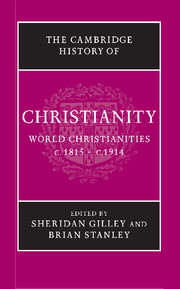Book contents
- Frontmatter
- 1 Introduction
- PART I CHRISTIANITY AND MODERNITY
- PART II THE CHURCHES AND NATIONAL IDENTITIES
- 14 Catholic Christianity in France from the Restoration to the separation of church and state, 1815–1905
- 15 Italy: the church and the Risorgimento
- 16 Catholicism, Ireland and the Irish diaspora
- 17 Catholic nationalism in Greater Hungary and Poland
- 18 Christianity and the creation of Germany
- 19 Anglicanism, Presbyterianism and the religious identities of the United Kingdom
- 20 Protestant dominance and confessional politics: Switzerland and the Netherlands
- 21 Scandinavia: Lutheranism and national identity
- 22 ‘Christian America’ and ‘Christian Canada’
- 23 Spain and Portugal: the challenge to the church
- 24 Latin America: the church and national independence
- 25 Between east and west: the Eastern Catholic (‘Uniate’) churches
- PART III THE EXPANSION OF CHRISTIANITY
- Select General Bibliography
- Chapter Bibliography
- Index
- References
18 - Christianity and the creation of Germany
from PART II - THE CHURCHES AND NATIONAL IDENTITIES
Published online by Cambridge University Press: 28 March 2008
- Frontmatter
- 1 Introduction
- PART I CHRISTIANITY AND MODERNITY
- PART II THE CHURCHES AND NATIONAL IDENTITIES
- 14 Catholic Christianity in France from the Restoration to the separation of church and state, 1815–1905
- 15 Italy: the church and the Risorgimento
- 16 Catholicism, Ireland and the Irish diaspora
- 17 Catholic nationalism in Greater Hungary and Poland
- 18 Christianity and the creation of Germany
- 19 Anglicanism, Presbyterianism and the religious identities of the United Kingdom
- 20 Protestant dominance and confessional politics: Switzerland and the Netherlands
- 21 Scandinavia: Lutheranism and national identity
- 22 ‘Christian America’ and ‘Christian Canada’
- 23 Spain and Portugal: the challenge to the church
- 24 Latin America: the church and national independence
- 25 Between east and west: the Eastern Catholic (‘Uniate’) churches
- PART III THE EXPANSION OF CHRISTIANITY
- Select General Bibliography
- Chapter Bibliography
- Index
- References
Summary
Shortly after the proclamation of the Second German empire in 1871, the future Prussian court preacher Adolf Stoecker rejoiced, remarking: ‘The holy, Protestant empire of the German nation is now completed.’ This statement exemplifies the important, if often overlooked, contribution that Christianity made to the construction of modern Germany. The phrase itself recalls the ‘Holy Roman Empire of the German Nation’ that perished in 1806 and demonstrates the ongoing resonance of the imperial idea for conceptualising the nation throughout the nineteenth century. But by substituting the word ‘Protestant’ (evangelisch) for the word ‘Roman’, Stoecker also asserted that creating this new Germany was not simply a matter of ‘blood and iron’ or even of establishing acceptable constitutional relationships among the member states. In a very fundamental way it entailed resolving a question left open since the Reformation: what kind of Christian nation would Germany be?
Christianity exercised a telling influence on the creation of modern Germany. After 1815 confessional pluralism existed in most of the major German states, compelling each one to develop new legal and social policies to deal with the reality of religious co-existence. The redrawing of state boundaries also necessitated alterations in ecclesiastical organisation and the clarification of church–state relations. Such measures were intended to promote interconfessional peace, but as religious revivals renewed a sense of confessional particularity among Catholics and Protestants, state policies increasingly touched off dissent and socio-political conflict. By mid-century, the heightened sense of confessional difference had constructed a minefield for German politicians that affected domestic politics, church–state relations and, above all, public discussions of the ‘German question’.
- Type
- Chapter
- Information
- The Cambridge History of Christianity , pp. 282 - 300Publisher: Cambridge University PressPrint publication year: 2005

